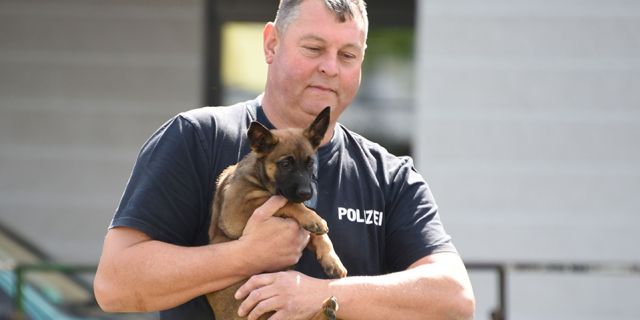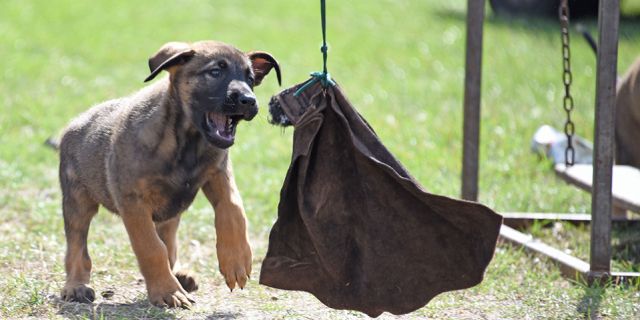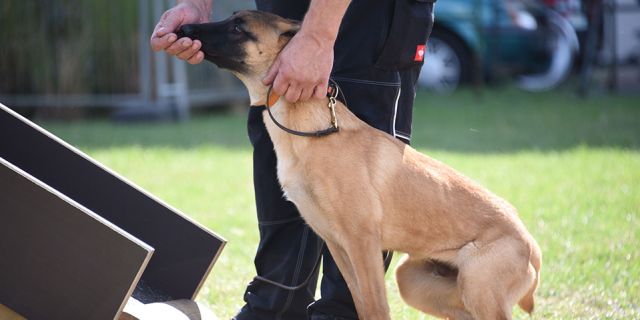Stripe editorial team
The NRW police not only train their own guard dogs, the four-legged friends are usually even bred in-house. There are currently 24 puppies in the kennels of the "Central Training Center for Service Dogs" in Schloß Holte-Stukenbrock - all potential police dogs. But how do you decide which puppy will actually make it into the police force? Thorsten Behlau is Head of the Purchasing and Breeding Department at the NRW State Office for Training, Further Education and Personnel Affairs (LAFP). In this interview, he explains how things work in the "dog kindergarten" and how to make the right choice.
Mr. Behlau, when do the puppies come to you in Schloß Holte-Stukenbrock?
Thorsten Behlau: The puppies are usually born at one of our pet owners' homes. They stay there until they are around four weeks old. It is very important to us that the dogs spend the first few weeks in this protected environment. Only then are they transferred to us in Schloß Holte-Stukenbrock - together with their mother, of course. After a short acclimatization phase, the dogs are then ready for sighting and playful training.
What does the dog kindergarten look like on your premises?
Behlau: In principle, the premises here are not so dissimilar to a real kindergarten. There are rooms with soft floors, lots of toys, balls, cardboard boxes in different sizes and wobble boards. We also have an outdoor area with small obstacles and steps, which the puppies love to use, especially when the weather is nice. The dogs are housed in puppy kennels with modern technical equipment - there is underfloor heating, for example. There is also a separate area for the breeding bitch, where she can retreat and relax.
How do you find out whether a puppy is suitable as a police dog?
Behlau: Our main task is to observe. For example, the dogs come into a room with play equipment and we see how they behave: Do they approach things openly? Are they sensitive to noise? Do they have problems when people are in the room? These situations then become more and more complex over time. We then take the dogs to one of our workshops, such as the carpentry shop or the vehicle workshop, where it is sometimes a bit louder or the noises are unusual. Or we test how they react to larger groups of people. Our students also train here on the premises, so they are included in the process.
How can you prepare the puppies for service at such an early stage?
Behlau: We try to offer the dogs as many different so-called "images" as possible, i.e. as many situations as possible that they might encounter later in life as a service dog. The puppy finds itself in a protected environment in which it feels comfortable: its siblings are there, as well as the owner it has known since birth. Then you can also work out unfamiliar things in a playful way, such as walking on a difficult surface like a grate or on wet or slippery floors. The dog then stores this situation in a positive memory. The more of these images the dog positively memorizes in the first few weeks, the less stressful such situations will be for him when he is older. It is important to make the most of these first few weeks and offer as much as possible without overtaxing the dog. Incidentally, we follow the rhythm of the animals: When they have their agile phase, this time is used for training. This can sometimes be early in the morning or late in the evening. Other tasks then have to wait.
What qualities must a good service dog have above all else?
Behlau: A police dog must have a healthy level of self-confidence. This can be recognized quite well at such an early stage. For example, if the dog is to enter a room, you can observe and assess it: Does he prefer to stay in the hallway, along the lines of "I'd rather not go in there now." Or does he march through the door with broad shoulders, following the motto: "What does the world cost?" Environmental safety is also important. Does he remain calm in unusual and stressful situations? Does he remain calm when things get loud or there are lots of people around? Play motivation is also an important factor. A pronounced play instinct is desirable. If a dog quickly loses interest in a toy and doesn't get excited about it at all, then it is probably not suitable for service.
How do you decide which puppy to train as a service dog?
Behlau: The puppies are always observed and assessed by several people. This is partly based on a school grading system. However, a lot of things are also documented freely, because the animals' behavior can't be pressed into a fixed pattern. It is important that it is not a snapshot, but a long-term observation over several weeks. After all, every dog can have a bad day. This assessment phase lasts four to six weeks. After that, we decide together whether a puppy is potentially suitable for police service or not. As a rule, this is 50 to 60 percent of the dogs. So of the 24 puppies we have here at the moment, that would be around 15 that we consider suitable. Of the dogs we place, around 90 percent go on to complete their training.
What happens to the puppies that don't become service dogs?
Behlau: All dogs that don't pass this really high hurdle are then sold privately. Interested parties are of course checked by us. We check whether the basic requirements for keeping such a dog are met. Our dogs are mainly Malinois, which are Belgian Shepherds. The future owner should definitely have experience. This breed is not suitable for owners with no previous experience. Malinois are also very agile and need a lot of exercise.
After eight to ten weeks, the puppies that have made the grade join their service dog handlers. What happens then?
Behlau: The dogs then begin their training, which takes place at the respective district police authority. The training lasts between 18 and 24 months and concludes with the police service dog test. The dogs then remain in service until they are around nine or ten years old. During this time, they live with their service dog handler, who accompanies the dog virtually throughout its entire life. The two are a team with a very special relationship. That's why a handler chooses his dog himself and gives him his name. It just has to be right.
Don't you find it difficult to hand over the dogs?
Behlau: You develop a certain level of professionalism over the years. But for our animal carers in particular, who have been looking after the dogs from day one, who may even have witnessed the birth, it's sometimes not so easy. But we see the dogs again regularly, namely when they come to the various training courses we offer together with their service dog handler. It's always nice to see how the dogs have developed.
The interview was conducted by Simone Bauer.


